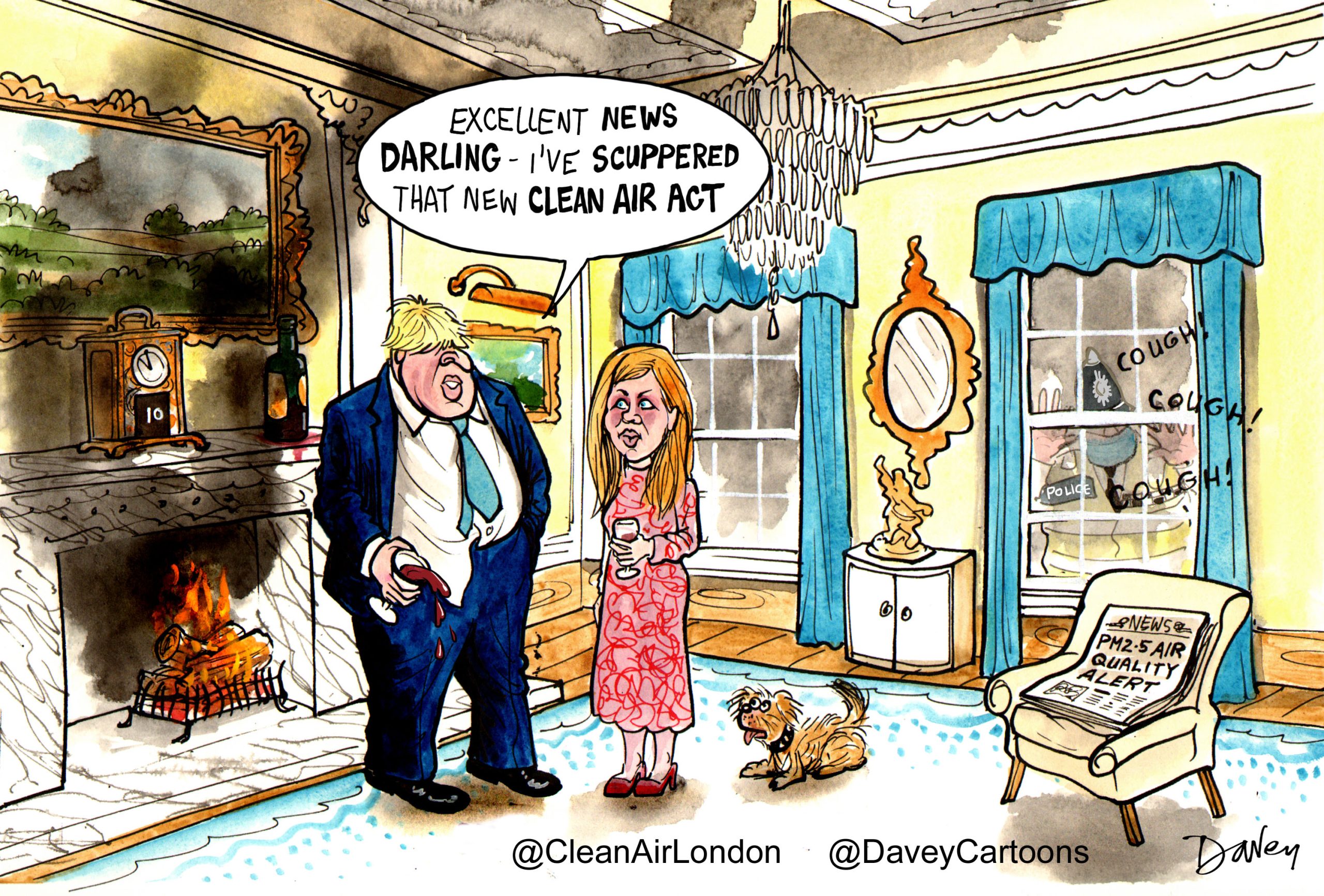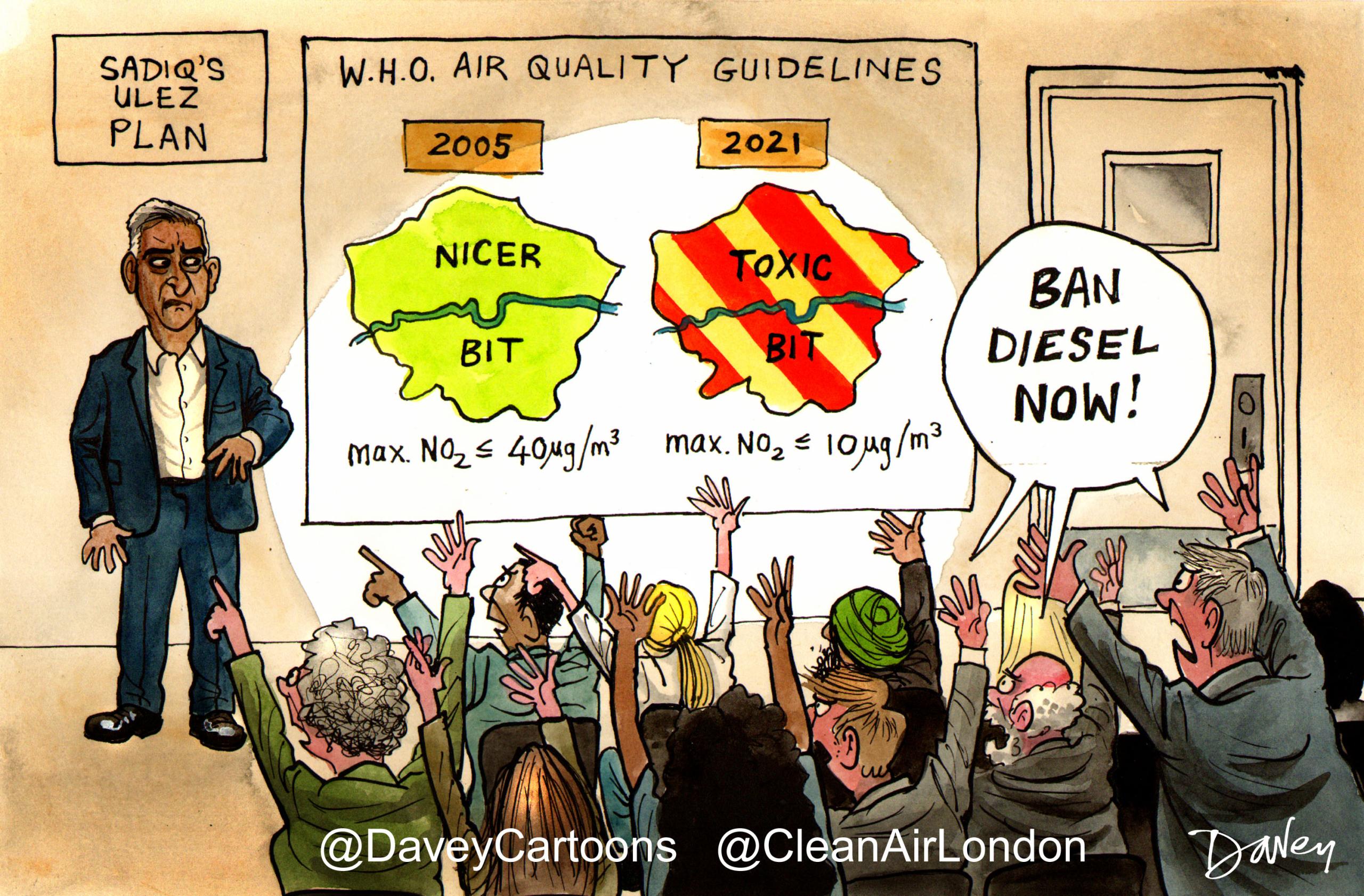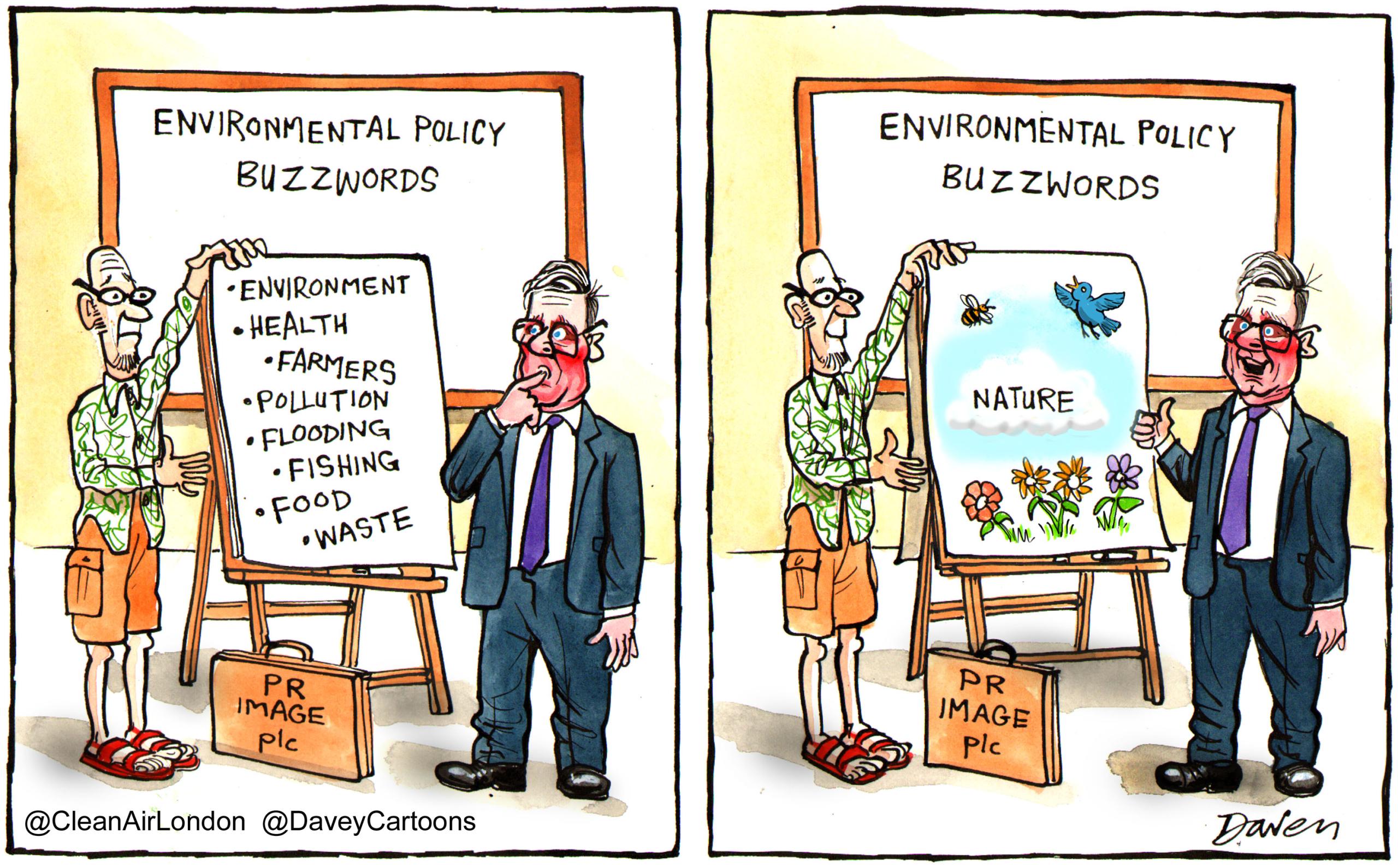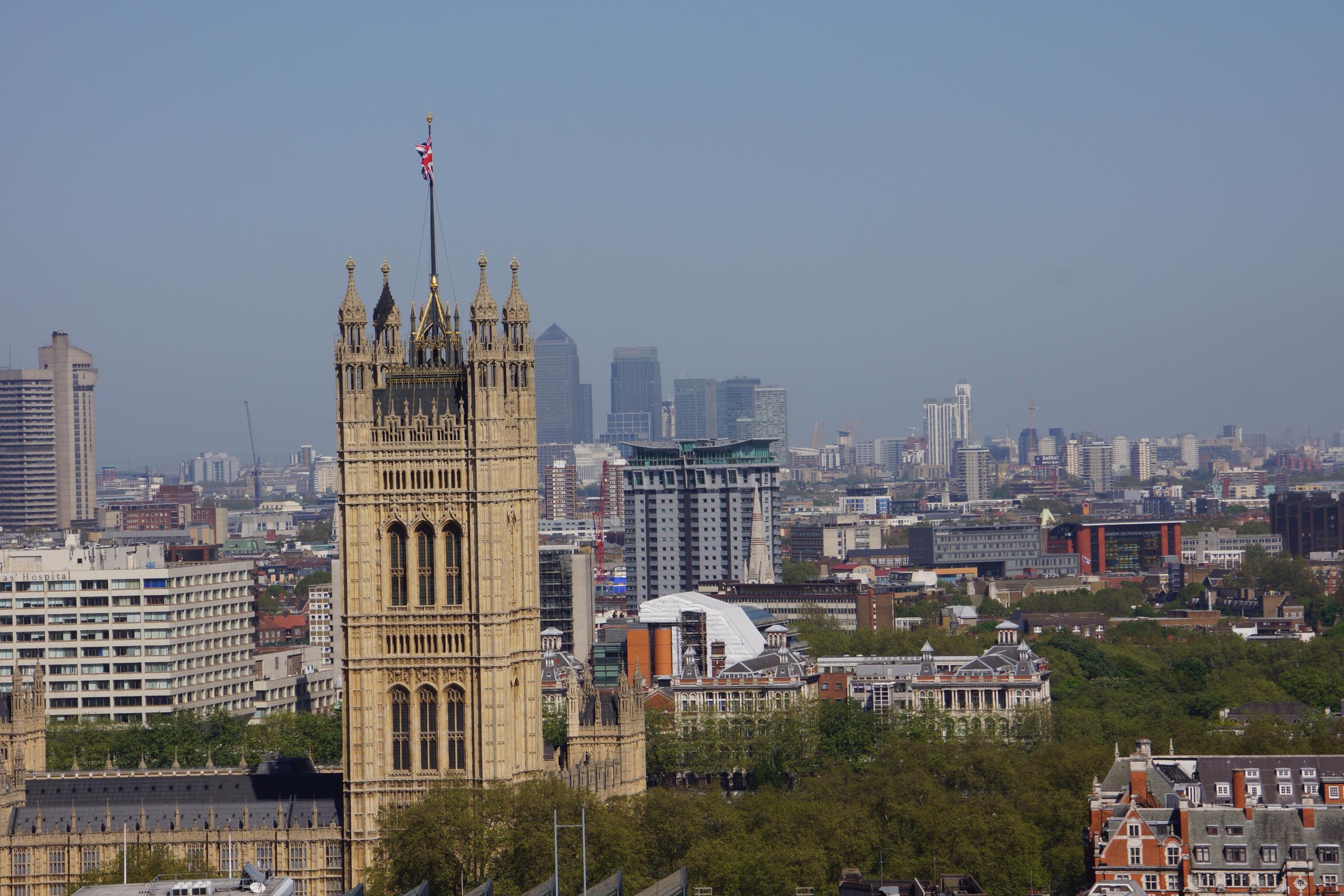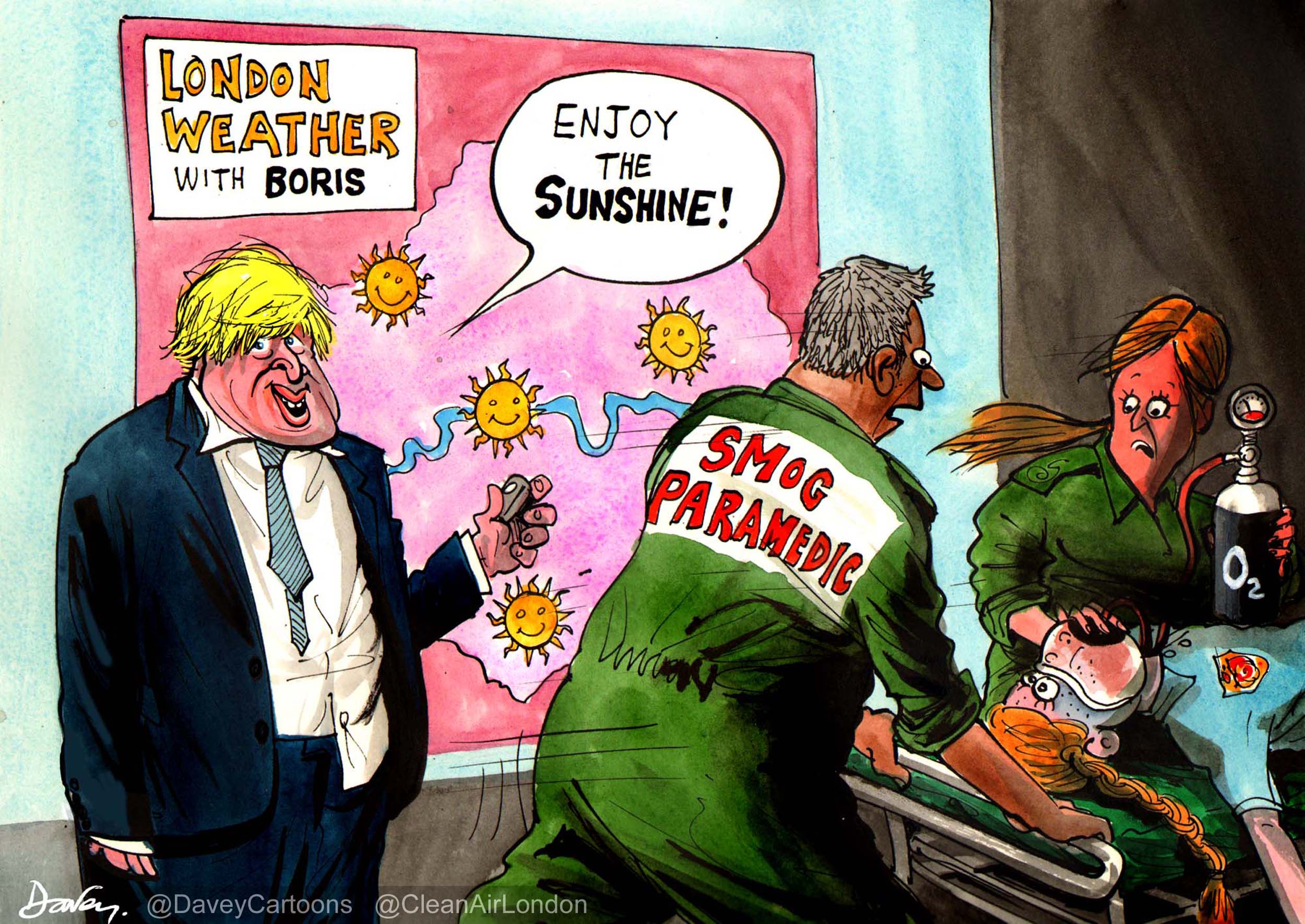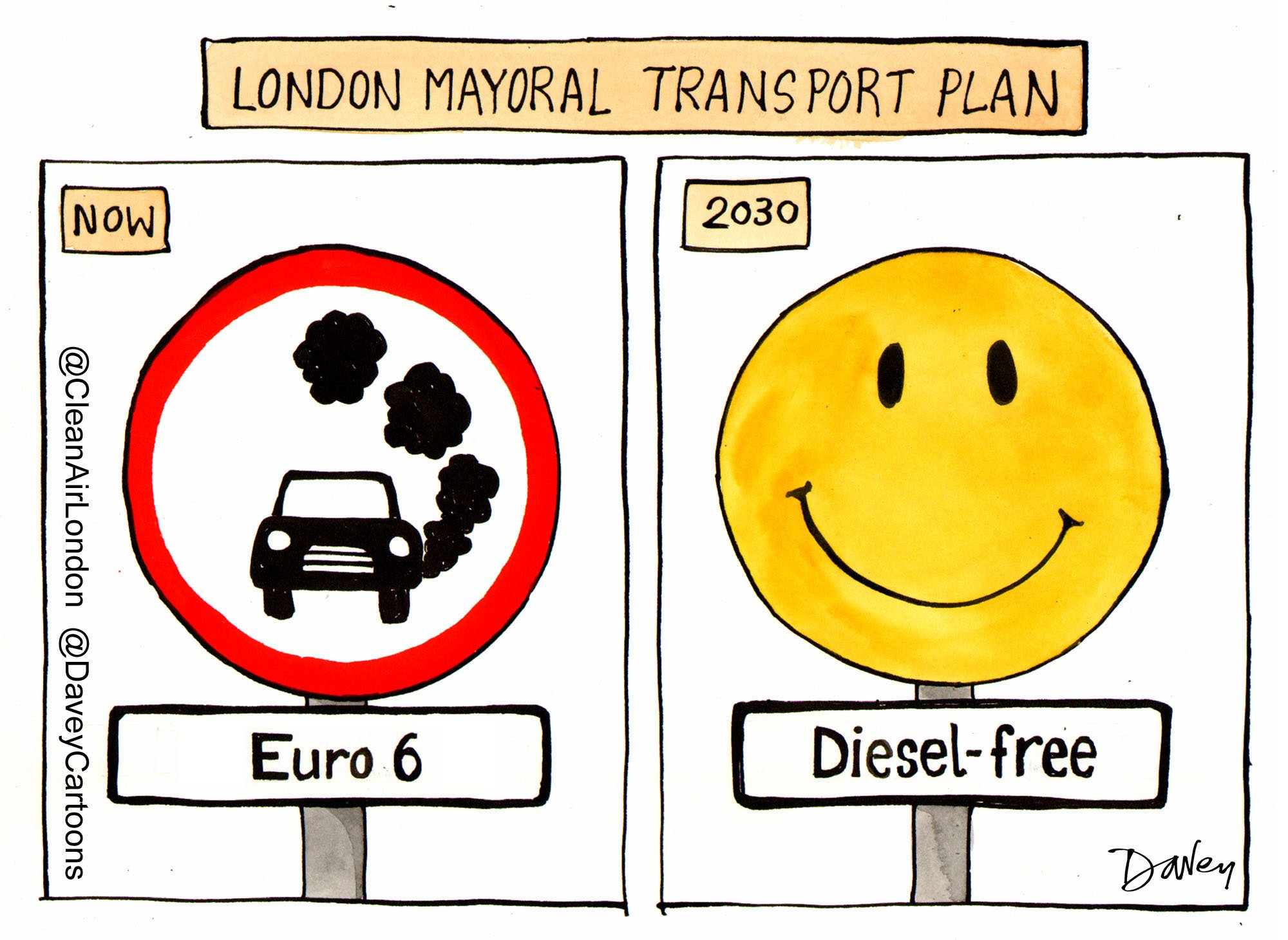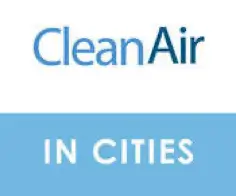CAL wrote to Defra on 11 August 2021 to raise serious concerns and ask 17 questions about the cosy world of the wood stove industry and its regulators and Defra’s failure to set dates to end the installation and use of wood burning stoves in urban areas. In response, Defra has failed to answer many questions properly or at all and refused to release vital information
CAL has found at least 10 failings by Defra which range from governance, supervision, certification and an absence of auditing to a failure to compare laboratory test standards against real world emissions to protect consumers, public health and the environment. These failings risk another ‘dieselgate’ or ‘woodgate’
Defra and BEIS seem oblivious to the Climate Change Committee’s advice that wood burning should not be counted towards low carbon energy or renewables targets and that wood burning appliances should be phased out. This is alarming ahead of BEIS’ Biomass Strategy 2022
Probing parliamentary questions from Geraint Davies MP, Chairman of the powerful All Party Parliamentary Group (APPG) on Air Pollution, have confirmed or revealed further extraordinary government failings which raise many more questions
CAL calls for urgent Parliamentary Select Committee investigation into domestic wood burning and a new Clean Air Act before the 70th anniversary of the Great Smog in December 1952
Clean Air in London (CAL) has been investigating issues around the wood burning industry since early 2021. The first and second parts of CAL’s investigation summarised and revealed: seven months of its constructive correspondence with the Climate Change Committee[1]; and Government failings around the implementation of the new Ecodesign Regulations for wood burning stoves from 1 January 2022[2]. These reports were published on 22 and 29 December 2021 respectively.
This third part of CAL’s investigation has focused on the structure, governance and behaviour of key organisations in the wood burning stove industry. After months of research, CAL wrote to Defra on 11 August 2021 to raise serious concerns and ask 17 questions about the cosy world of the wood stove industry and its regulators (including Defra) and Defra’s failure to set dates to end the installation and use of wood burning stoves in urban areas.
Defra took more than three months to respond to CAL’s initial letter and failed to answer many questions properly or at all and refused separately to release vital information requested under the Freedom of Information Act and/or the Environmental Information Regulations.
CAL sent Defra’s weak reply and CAL’s follow up letter to Defra (dated 4 December 2021) to the Environmental Audit Committee, the Environment, Food and Rural Affairs Committee and Geraint Davies MP, Chairman of the powerful All Party Parliamentary Group (APPG) on Air Pollution. Geraint Davies MP followed up by asking many probing questions of the Government which revealed further extraordinary failings to understand, regulate or reduce domestic wood burning emissions.
For example, Geraint Davies MP discovered that BEIS and Defra had done so little to publicise the implementation of new Ecodesign Regulations for new wood burning stoves from 1 January 2022 that they were not contacted by a single journalist or media organisation in December 2021.
CAL is publishing its correspondence with Defra about wood burning stoves with this third part of its investigation.
CAL has also instructed Harrison Grant Solicitors to lodge a formal complaint and appeal with the Information Commissioners Officer about Defra’s refusal to release vital information.
Quotes:
Simon Birkett, Founder and Director of Clean Air in London, said:
“The first and second parts of Clean Air in London’s year-long investigation into domestic wood burning involved: seven months of constructive correspondence with the Climate Change Committee; and exposed Government failings around the implementation of the Ecodesign Regulations for wood burning stoves from 1 January 2022, respectively.
“This third part of Clean Air in London’s investigation into domestic wood burning has exposed the cosy world of the wood stove industry and its regulators and extraordinary failings by the Government.
“For example, Defra has failed:
- in its governance of the wood burning stove industry;
- to ensure the proper separation and independence of certification bodies or processes;
- to answer or challenge questions raised by the wood burning stove industry;
- to publish reliable and timely estimates of PM2.5 primary emissions;
- to disclose internal communications properly requested under FOIA/EIR rules;
- to warn consumers about the dangers posed by wood burning stoves or protect them by introducing competition and auditing of certification bodies in the industry;
- to address flexibilities in emissions testing or understand real world emissions;
- to protect consumers and public health through independent standard setting;
- with BEIS to understand the Climate Change Committee’s stance on domestic wood burning; and
- to tell consumers or the public about Ecodesign wood burning stoves or the need still to comply with the Clean Air Act 1993 and other regulations in Smoke Control Areas.
“At the recent All Party Parliamentary Group on Air Pollution’s roundtable with the Air Quality Minister, Jo Churchill MP, she seemed more concerned about her chimney sweep than public health and lessons learned from the successful implementation of the Clean Air Act 1956[3].
“CAL is also deeply concerned about the lack of joined up action between Defra and BEIS. Defra leads on air quality while BEIS leads on greenhouse gases and the implementation of the Ecodesign Regulations. Both seem oblivious to the Climate Change Committee’s advice that wood burning should not be counted towards low carbon energy or renewables targets and that wood burning appliances should be phased out. This is particularly alarming ahead of the publication of BEIS’ Biomass Strategy 2022.
“CAL is particularly concerned that the Government is failing to protect consumers, public health and the environment from the dangers of wood burning. For example, the Government has still not published the regulations on the purchase and use of wood burning appliances in one place on its website to increase the accessibility of that information for consumers[4].”
“For example, how many people know that Ecodesign Regulations are now in force and that the Clean Air Act 1993 requirements in Smoke Control Areas (SCAs) will remain unchanged[5]? Or that it is only permissible to burn authorised smokeless fuels (such as anthracite) in SCAs unless the fuel is being burnt in an exempt appliance (which will have its own list of suitable fuels for use)?[6] Or that the Air Quality (Domestic Solid Fuels Standards) regulate the sale of all domestic solid fuel in England and that wood sold in volumes under 2 cubic metres must be certified (by Woodsure) as ‘Ready to Burn’? Or that a new wood burning stove can only be placed on the UK market after 1 January 2022 if it complies with the Ecodesign Regulations?[7]”
“CAL is therefore calling for an urgent Parliamentary Select Committee investigation into domestic wood burning and a new Clean Air Act before the 70th anniversary of the Great Smog in December 1952 to clear up this mess and address a public health and climate catastrophe.”
END QUOTES
PM2.5 emissions
Defra’s Clean Air Strategy 2019[8] estimated that burning wood and coal in open fires and stoves makes up 38% of the UK’s primary emissions of fine particulate matter PM2.5 (page 10).
In light of these startling findings, Defra pledged to: ensure that “only the cleanest stoves” would be available for sale by 2022; and make changes to smoke control legislation to make it easier to enforce (page 10). On 1 May 2021, new legal restrictions came into force under ‘The Air Quality (Domestic Solid Fuels Standards) (England) Regulations 2020’ on the kinds of fuels that people are able to burn at home[9] e.g. banning ‘wet wood’. New Ecodesign standards[10] were implemented on 1 January 2022[11] based on EU Directive 2015/1185[12].
In February 2021, Defra confirmed that “The use of wood in domestic combustion activities accounted for 38% of PM2.5 emissions in 2019” and that “Emissions of PM2.5 from domestic wood burning more than doubled between 2003 and 2019 (from 20 [thousand] to 41 thousand tonnes) and increased by 1.0% between 2018 and 2019[13] and [14]”. Put bluntly, domestic wood burning is a serious and increasing problem.
New evidence published in the second part of CAL’s investigation into domestic wood burning found that Defra may have quietly slashed its estimate for domestic wood consumption by up to 67%[15] and [16]. Defra is expected to publish new estimates on 15 February 2022[17].
The Stove Industry Alliance (SIA) published a report titled ‘Up in smoke: The contribution of domestic wood burning to UK particulate matter emissions’ (dated August 2021)[18] on 31 January 2022[19]. The study estimates that between 46% and 51% of domestic PM2.5 emissions originate from outdoor burning e.g. bonfires. The report was prepared for the SIA by Clean Stove Consultants Ltd.
The sources and proportions of PM2.5 emissions are important because PM2.5 is widely considered to be the most harmful air pollutant with the largest effect on the population as a whole. Public Health England estimates that the attributable fraction for annual mean concentrations of PM2.5 was 5.1% of all deaths in England in 2019[20]. Of course, wood burning is a serious problem for air quality (and climate change) whether it is responsible for 10-20% or 40% of total PM2.5 primary emissions.
The World Health Organisation (WHO) published updated air quality guidelines[21] on 22 September 2021 which halved the previous guideline for PM2.5, slashed the guideline for nitrogen dioxide and included new good practice statements for black carbon and ultrafine particles.
Climate Change Committee
The first part of CAL’s investigation into domestic wood burning involved seven months of constructive correspondence with the Climate Change Committee with findings and correspondence published on 22 December 2021[22].
A letter from Chris Stark, Chief Executive of the Climate Change Committee, dated 8 June 2021 pointed CAL to the Climate Change Committee’s UK Health Expert Advisory Group’s report titled ‘Sustainable Health Equity: Achieving a Net Zero UK’[23] (published on 6 November 2020) which recommended four regulatory interventions to reduce power emissions (page 16):
- Transition to clean energy sources – decarbonising both power generation and industrial, commercial and domestic energy.
- Set a target date to eliminate home installations of wood burning and gas stoves, prioritising elimination in urban areas.
- Set a further target date to eliminate/remove all existing wood burning stoves in urban areas.
- Enforce existing and new fuel standards.
[CAL emphasis.]
The same letter confirmed the Climate Change Committee’s longstanding position on wood burners that they should not be counted towards either low-carbon or renewables targets.
Further research by CAL found that wood burning is rarely sustainable or climate friendly except under highly specific conditions such as where it comes from fast growing forests, has a low transport and energy footprint (e.g. natural drying), uses untreated offcuts and takes place away from the gas grid and urban areas. Even then its benefits are questionable.
After exchanging many constructive further emails, a second letter from the Climate Change Committee dated 21 December 2021 confirmed that prior to the Sixth Carbon Budget advice, the Climate Change Committee’s advice was already that Government should not support wood burning stoves as part of climate policy[24].
Emission standards
The second part of CAL’s investigation into domestic wood burning focused on emissions standards and testing and the implementation of the Clean Air Act 1993 and the Ecodesign Regulations for solid fuel appliances. CAL’s findings were published on 29 December 2021[25].
The Clean Air Act 1956 was introduced after the Great Smog to reduce smoke pollution and sulphur dioxide from household fires together with certain emissions from chimneys and smoke-stacks. It was updated in 1968 and 1993.
CAL understands that the smoke emission limits set for appliance exemptions under the Clean Air Act 1993 are based on British Standard PD6434:1969 i.e. a standard originally published in 1969 following the Clean Air Act 1968. Defra confirmed on 15 December 2021 that the Environment Act 2021 did not amend the emission limits for appliance exemptions in wood burning stoves[26].
Remarkably, the standard seems unchanged in 2022 and still appears only to address smoke generation, not emissions of individual pollutants or their amount. The current standard might be achieved simply by limiting the amount that a Defra-approved stove can be ‘closed down’ or ‘starved of air’. CAL has found one such ‘Defra kit’ on offer for as little as £1.10[27].
Defra implemented the first phase of the Air Quality (Domestic Fuel Standards) (England) Regulations 2020 on 1 May 2021. These require a review of their provisions within five years of the legislation being made.
On 1 January 2022, new ‘Ecodesign’ regulations, based on EU regulation 2015/1185[28], entered into force. All new stoves entering the UK market need to meet these new emissions standards[29].
However, even the emissions of Ecodesign stoves are still about six times the amount of particulate matter from a Euro VI compliant HGV according to a report by the Air Quality Expert Group titled ‘The Potential Air Quality Impacts from Biomass Combustion’[30] (Figure 2 on page 18). The Clean Air Strategy 2019 shows the emissions of a ‘Defra-exempt/Ecodesign stove’ being over 20 times the particulates of an oil-fired boiler per unit of heat released (section 6.3 on page 58).
Ecodesign Regulations have been in force since 1 January 2022 and the Clean Air Act 1993 requirements in Smoke Control Areas will remain, as the two regulate different things. The Ecodesign Regulations are intended to raise emission and efficiency standards for wood burning stoves across the whole UK whilst allowing additional smoke emission assessment and control to remain in place under the Clean Air Act 1993[31].
CAL is seriously concerned therefore about emissions from existing wood burning stoves (never mind fireplaces) and new stoves and the effects on public health.
Emission testing
CAL is concerned also about flexibility with regards to the circumstances of testing to meet the Ecodesign standards including:
- the heat output at which the test will be carried out;
- the amount of fuel being burned during the test;
- how often the stove is refuelled – although no less than 45 minutes; and
- the air supply, which can be adjusted during the test using the stove vents.
Other variables that could be adjusted include: air controls; flue draught; and moisture content on the test fuel. Of course, none of these might be optimised in real world use.
There seems likely therefore to be a significant difference between laboratory test standards and ‘real world conditions’ for wood burning stoves e.g. as we have seen with diesel vehicle emissions. A KIWA report about commercial biomass boilers, with HETAS as one of the project partners, highlighted a 15% drop in efficiency and emissions higher by a factor of between two and eight depending on the operational settings of the boiler (section 7.1 on page 111)[32].
Defra expressed concerns in the Clean Air Strategy 2019 about testing (paragraph 6.3.2 on page 59):
6.3.2 Ensuring only the very cleanest stoves can be bought and installed
“In 2022 the new EU Ecodesign regulations will come into force, which will mean that all new stoves will need to meet agreed emissions standards, regardless of where they are used. This will raise the standard of appliances across the whole country.
“These emission limit requirements for solid fuel appliances will need to be coupled with an effective approach to testing. Measuring emissions of particulate matter from wood stoves is a recognised challenge and Defra is working with industry sectors and test houses to review different methods for testing stove emissions to determine what test methods are most reliable.”
As of 1 January 2022, new Ecodesign regulations require that when a solid fuel space heater (wood burning stove) is placed on the UK market, the product’s efficiency and its emissions of particulate matter, organic gaseous compounds, carbon monoxide and nitrogen oxides under standardised test conditions must be provided in the instruction manual for installers and end-users as well as on a free-access website[33]. Ecodesign requirements for domestic solid fuel appliances are set out in Annex II of the Ecodesign Regulations which can be found at Commission Regulation (EU) 2015/1185 of 24 April 20215 implementing Directive 2009/125/EC of the European Parliament and of the Council with regard to ecodesign requirements for solid fuel space heaters (Text with EEA relevance)[34] and [35].
The market surveillance authority, the Office of Product Safety and Standards (OPSS), undertake a programme of market surveillance that is risk based and proportionate whilst operating under the Regulators Code. That OPSS has engaged with stakeholders to raise awareness of the new ecodesign requirements that took effects in January 2022. They also offer support with compliance.
More than three years after Defra proposed to ensure “only the cleanest stoves” by 2022, there remain serious concerns about the lack of progress being made on standards, the efficacy of the new and proposed testing regimes and the clear risk of another “dieselgate” or “woodgate” – at potentially enormous cost to public health.
The wood stove industry
As CAL understands it, there are five particularly important entities in the UK wood stove industry:
- Defra has appointed HETAS Limited[36] (Heating Equipment Testing and Approval Scheme) (HETAS) to act as the ‘official body recognised by the government to approve solid fuel burning heating appliances, fuels and services’ e.g. under sections 20 and 21 of the Clean Air Act 1993[37] (which relate to the ‘prohibition of emission of smoke in smoke control areas’). This includes biomass and the registration of installers and servicing businesses. HETAS provides the webpages about UK Smoke Control Areas for Defra’s website[38].
On 23 June 2021, HETAS announced that Woodsure would take over the running of the Government’s Biomass Suppliers List (BSL) on behalf of BEIS with effect from 1 July 2021[39]. On 13 August 2021, HETAS announced that it had launched a new registration scheme for engineers to demonstrate competency in the servicing and maintenance of domestic and commercial biomass appliances[40]. Engineers registered on the scheme will be able to meet the requirements placed on domestic and commercial recipients of the Renewable Heat Incentive (RHI) to prove their appliance is properly maintained;
- Woodsure emerged from the experience of Harvey Shopfitters Limited[41] and [42] and was incorporated by HETAS on 6 May 2016. Defra has appointed Woodsure Limited[43] as the Certification Body to administer the ‘Ready to Burn Scheme’[44] and [45] as recognised by the ‘Air Quality (Domestic Solid Fuels Standards) Regulations 2020’[46]g. set standards on the quality of fuel to be burnt in domestic stoves. Woodsure says it is the UK’s only woodfuel quality assurance and certification scheme[47]. Woodsure has been administering the BSL on behalf of BEIS since 1 July 2021[48]. The BSL supports the Government’s RHI scheme by ensuring that RHI payments are only issued to biomass boilers using woodfuel that meets certain sustainability and legality requirements. The assessment of fuel quality for BSL fuels will become a core requirement of the RHI from 1 April 2022;
- the Stove Industry Alliance[49] which is dedicated to “promote and explain the benefits of wood-burning stoves and biomass appliances”. It is an alliance of manufacturers, suppliers, distributors, independent retailers, advisory/test house bodies, sweep associations and other interested parties. The SIA Ecodesign Ready scheme is an SIA initiative that awards a ‘Mark’ to wood burning appliances that meet requirements of EU Regulation 2015/1185 with regards to ecodesign requirements for solid fuel local space heaters[50];
- KIWA[51] [Gastec] which is one of HETAS’ approved training centres. It has one of the most ‘advanced’ testing centres in the UK for solid fuel appliances and says that it works closely with HETAS to ensure that “compliant products are listed within their Official Guide”; and
- clearSkies Mark Limited[52] which sets an emissions and energy performance certification mark for solid fuel stoves and fireplaces. In addition to meeting requirements of Ecodesign for efficiency and emissions, all clearSkies certified appliances at Level 3 or above will also have been verified by the scheme administrator, KIWA Ltd, as meeting the requirements for Defra exemption[53]. The clearSkies Scheme has been developed jointly by representatives of appliance manufacturers through the SIA, chimney system manufacturers, appliance testing laboratories and bodies providing certification of biomass fuelled appliances[54].
This is an unusually cosy structure for any regulated industry, not least one needing, with Defra and BEIS, to protect public health and mitigate climate change.
CAL’s 17 questions, Defra’s ‘answers’ and Parliamentary questions from Geraint Davies MP
CAL has raised serious questions that need to be answered about the strength and membership of the responsible regulatory bodies, and their cosy and potentially conflicting relationship with the wood burning stove industry. These include:
Defra has failed in its governance of the wood burning stove industry
- CAL: We note that two directors of HETAS Limited[55] and [56] – Bruce Allen and Andrew Harvey – are also the directors of Woodsure Limited[57] and [58] – its wholly-owned subsidiary. Indeed, Mr Allen seems to be the Chief Executive of both. Does Defra consider that to be appropriate, given the important (but separate) role and influence those entities have over the sector?
Defra: Hetas describes itself as “the national organisation working for consumer safety and the wider public interest in safe, efficient and environmentally responsible use of biomass and other solid fuels.” Woodsure describes itself as “a not-for-profit organisation, striving to raise the quality of woodfuel in the industry.” Hetas’ website also states that “HETAS and Woodsure support cleaner and safer choices for the use of biomass and other solid fuels, appliances and associated technologies.” Given the complementary remits of these organisations, we do not consider it surprising that they share key staff members.
Among other things, our terms and conditions require that tenderers let us know of any circumstances where a conflict of interest exists. They also have to declare that they have not entered into any agreements aimed at distorting competition within the last three years. Contractors are required to ensure they are not placed in a position where there is a conflict between the interest of the contractor and the duties owed to Defra under the contract.
CAL further question (4/12/21): You have stated that tenderers are required to let you know of any circumstances where a conflict of interest exists. We assume, but ask you to confirm, that no such conflict of interest has been declared by either HETAS Limited or Woodsure Limited. If that is the case, to be clear, please confirm that Defra does not consider there to be a conflict of interest on the basis of the information that CAL has provided to Defra.
Defra: [Response awaited]
PQ from Geraint Davies MP revealed that Defra does not hold such a register[59].
- CAL: We understand that until at least March 2021, HETAS was an active member of the SIA – an industry body established (among other things) “to promote the benefits of wood-burning stoves”. Please confirm whether that is correct and whether HETAS is still a member.
Defra: It is not for Defra to comment on the relationship between two external bodies.
PQ from Geraint Davies MP revealed that Defra is aware that, outside of the appointed certification bodies, there are industry-led certification schemes for domestic stoves which are intended to encourage manufacturers to achieve higher than minimum standards[60].
See UIN 88613.
- CAL: If HETAS is not still a member of the SIA, please confirm why.
Defra: As above.
CAL comment: It should be stressed that there is no suggestion by CAL of any misconduct on the part of the individuals referred to above. However, pending a full explanation, it seems clear that Defra has failed and continues to fail to ensure the proper separation and independence of certification bodies or processes so as to ensure that conflicts, or the risk and perception of conflicts, do not arise. HETAS’s relationship with the SIA is a case in point.
Defra has failed to ensure the proper separation and independence of certification bodies or processes
- CAL: In any event, we invite Defra’s confirmation as to whether you were aware of this relationship, and your views as to whether you consider it appropriate for a body established to regulatethe commercial stove industry, to be a member of an organisation designed to promote
Defra: Hetas and Woodsure are not regulatory bodies. They have been appointed as approved certification bodies under the Air Quality (Domestic Fuel Standards) (England) Regulations 2020. Their role is to check that fuels meet the required standards and certify them if they meet the legislation’s requirements. Hetas has also been appointed as the contractor providing technical support to enable Defra to meet its legal obligations under sections of the Clean Air Act 1993 related to authorised fuels and exempt appliances.
Their role is to check that fuels and appliances meet the relevant requirements and can be treated as authorised fuels and exempt appliances in Smoke Control Areas. Defra is the regulatory body responsible for both these pieces of legislation.
CAL further question: In your own words, the role of HETAS is “to check that fuels meet the required standards and to certify them if they meet the legislation’s requirements”. SIA’s role is (amongst other things) “to promote the benefits of wood-burning stoves” (emphasis added). I ask again, was Defra aware of HETAS’ relationships with SIA prior to my correspondence of 11 August? Further, and in any event, please confirm whether, now that Defra is aware of these matters, it considers the relationship between HETAS and SIA appropriate in the context of HETAS’ contract with Defra, given of their respective roles?
Defra: [Response awaited]
Defra has failed to answer or challenge questions raised by the wood burning stove industry
- CAL: Please confirm whether Defra is aware of the September 2019 report entitled “A review of the impact of domestic combustion on UK air quality”, which was published by HETAS “with the support of the Stove Industry Alliance”. There are pages about the report on HETAS’s website today[61] and [62] with a link to download it. The report appears on several manufacturers’ websites[63] to challenge Defra’s “38%”. See also the SIA webpage[64] and press release[65] relating to it.
Defra: We confirm Defra is aware of the report entitled “A review of the impact of domestic combustion on UK air quality”.
PQs from Geraint Davies MP found Defra failing again to answer what assessment it has made of the implications for its policies of the conclusions of the HETAS report.
See UIN 88610[66].
Defra has failed to publish reliable and timely estimates of PM2.5 primary emissions
- CAL: Does Defra stand by its estimate(s) of “38%” in the Clean Air Strategy 2019 and separately in national statistics in February 2021?
Defra: The figures used in the Clean Air Strategy 2019 are based on the best available data at the time and we stand by them. We are continuously gathering new evidence and data to improve our emissions estimates and reduce the related uncertainty.
CAL further question: We note your response on this point. Does Defra consider that the figures used in the Clean Air Strategy 2019 (and restated in national statistics in February 2021) are accurate as at today’s date, in light of the current evidence and data it has gathered? Further, and in any event, please send me a copy of the Defra study on domestic wood consumption referred to in Note 7 on page 43 of the ‘Digest of UK Energy Statistics (DUKES) Annual data for UK, 2020: Chapters 1 to 7’[67]published on 29 July 2021[68] that resulted in a change from 2,241 ktoe to 733 ktoe in the 2018 reference year i.e. a 67.3% reduction.
Defra: [Response awaited]
PQs from Geraint Davies MP revealed:
From BEIS: Domestic wood consumption was revised [down by 67%] in July 2021 to incorporate the results of research undertaken by the Department for the Environment, Food and Rural Affairs[69]. The Department for Business, Energy and Industrial Strategy published an article in March 2021 to quantify the likely impact for DUKES 2021[70] and [71].
See PQ references: UIN 98190[72], UIN 98191[73] and UIN 98191[74] and UIN 93681[75].
CAL comment: Defra’s estimate of domestic wood burning’s contribution to total PM2.5 primary emissions being 38% in 2019 seems to have been revised down in 2021 but it won’t say what to. If it is 10-20% not 38%, how did this mistake happen and what is causing the other PM2.5 emissions? Defra says that new estimates of emissions data for 2020 will be published on 15 February 2022[76].
Of course, wood burning is a serious problem for air quality (and climate change) whether it is responsible for 10-20% or 40% of total PM2.5 primary emissions.
Part two of CAL’s investigation into domestic wood burning explained more about these estimates on 29 December 2021[77]. For example, Defra has admitted that estimates of emissions from bonfires, fire pits and pizza ovens are not included in the National Atmospheric Emissions Inventory.
Defra has failed to disclose internal communications properly requested under FOIA/EIR rules
- CAL: Assuming Defra is indeed aware of this report, please confirm what information Defra holds relating to it e.g. internal emails about the provenance of the report or commenting on it, correspondence about the report or its conclusions with anyone outside Defra, briefing notes about it for Ministers etc. Please consider this to be a Freedom of Information/EIR request.
Defra: We have followed your instructions and have dealt with this question (only) as a request under the Environmental Information Regulations 2004. We will send you our response to this question separately.
CAL comment: CAL subsequently called for an internal review of Defra’s refusal to disclose vital information and has now instructed Harrison Grant Solicitors to lodge a complaint and appeal with the Information Commissioners Office.
- CAL: In particular, the above-mentioned report cites, seemingly in order to undermine, Defra’s assertion, in its landmark Clean Air Strategy, concerning the impact of stoves on emissions of fine particulate matter, that “Burning wood and coal in open fires and stoves makes up 38% of the UK’s primaryemissions of fine particulate matter. Please confirm Defra’s view on the HETAS report’s conclusions in that regard.
Defra: As set out above in response to Q6, the figures used in the Clean Air Strategy 2019 were based on the best available data at the time.
- CAL: As with questions [2 to 4 above] please also confirm whether your department has any misgivings about the regulator – HETAS – partnering with a commercially-driven industry body – the SIA – in commissioning and publishing a report which appears to be intended to undermine Defra’s Strategy and to promote the sale of wood-burning stoves?
Defra: Hetas is not a regulatory body. It is not for Defra to comment on the relationship between two external bodies, or to restrict their ability to comment on Government policies as they see fit, subject to the terms and conditions of any contract or agreement they may have with Defra.
CAL further question: Do the terms and conditions governing HETAS’ contract with Defra require it to declare current and future potential conflicts of interest? If so, in light of HETAS’ function (as set out above at Q4 above), would Defra expect HETAS to report to Defra regarding the potential for a conflict of interest arising in the context of HETAS partnering with a commercially-driven industry body – the SIA – in commissioning and publishing a report designed to promote the sale of wood-burning stoves?
Defra: [Response awaited]
Defra has failed to warn consumers about the dangers posed by wood burning stoves or protect them by introducing competition and auditing of certification bodies in the industry
- CAL: What steps is Defra’s taking to ensure genuine independence and objectivity on the part of regulators of the wood stove industry, to ensure that the public are not misled about the true environmental and health dangers posed by stoves?
Defra: As stated above, Defra is promoting cleaner, more efficient burning through its legislation and communications. Messaging on the certification bodies’ websites is consistent with this approach.
CAL further question: Your response to my question regarding what steps Defra is taking to ensure genuine independence and objectivity on the part of the certification bodies in the wood stove industry suggests that no proactive steps have been taken at all (save for checking the “messaging” on their respective websites). Is that the case? If not, please confirm what proactive steps have been taken. If so, what steps will be taken by Defra going forward?
Defra: [Response awaited]
PQs asked by Geraint Davies MP revealed that:
Defra has taken few, if any, urgent and proactive steps to (a) protect consumers and (b) public health by standards set by certification bodies in the wood stove industry. For example, there have been no formal annual audits of fees or charges for exemption applications.
See UIN 88613[78], UIN 88612[79] and UIN 88611[80].
- CAL: Why did Defra choose to use a nil value open tender process[81] (in August 2018) to select a provider of technical support to enforce the Clean Air Act 1993[82], how was the opportunity publicised and to whom, how many responses were received (and at what bid price) and why did Defra award the contact to HETAS seemingly for £27,432[83]?
Defra: The contract is self-funding with the costs of providing the service covered by the application fees. There were, however, some costs that could not be absorbed by the application fees and these formed the contract cost to Defra. Open competition was undertaken. The opportunity was advertised on Contracts Finder from 17/08/2018 to 24/09/2018. All interested parties could obtain a copy of the Invitation to Tender from Defra’s e-Tendering system, BRAVO. Eight suppliers accessed the ITT. Two suppliers submitted tenders. The tenders were evaluated to find the most economically advantageous tender. The technical and commercial split was 70%/30%. The commercial evaluation took account of both the costs to Defra and the price to manufacturers per application.
| Weighted Technical Score | Weighted Commercial Score | |
| Hetas | 70% | 30% |
| Unsuccessful Tenderer | 62% | 9.5% |
- CAL: Why did Defra choose to use a nil value open tender process[84] in October 2020 to select a provider to enforce the Air Quality (Domestic Solid Fuels Standards) Regulations 2020[85], how was the opportunity publicised and to whom, how many responses were received (and at what bid price) and why did Defra award the contact to Woodsure seemingly for £21,600[86]?
Defra: As above, the contract is self-funding with the costs of providing the service covered by the application fees. There were, however, some costs that could not be absorbed by the certification fees and these formed the contract cost to Defra. Open competition was undertaken. The opportunity was advertised on Contracts Finder from 19/10/2020 to 16/11/2020. All interested parties could obtain a copy of the Invitation to Tender from Defra’s e-Tendering system, BRAVO. Seven suppliers accessed the ITT. Two suppliers submitted tenders. The tenders were evaluated to find the most economically advantageous tender. The technical and commercial split was 60%/40%. The commercial evaluation took account of both the costs to Defra and the certification fees that suppliers of wood fuels would be charged.
| Weighted Technical Score | Weighted Commercial Score | |
| Woodsure | 60% | 40% |
| Unsuccessful Tenderer | 47% | 31% |
- CAL: On what basis did Defra assess and ‘agree’ the application fees for the exemption of an appliance or appliances under the Clean Air Act 1993 of up to £1,610 (excluding VAT)[87]e. as published by HETAS in October 2019?
Defra: As part of the procurement process tenderers completed a commercial workbook which listed their proposed fees and the resourcing costs that these fees covered. Each tenderer’s commercial workbook was assessed as part of the commercial evaluation. The application fees quoted were agreed with Defra in the subsequent contract and are reviewed by Defra annually at a minimum. In the contract it states that these fees are to be made clear on the hosting website/application pack and are to be fully auditable.
Defra has failed to address flexibilities in emissions testing or understand real world emissions
- CAL: Moving forward, another area of acute concern is the apparent unreliability and inconsistency of the appliance testing regime, not least with regard to the new Ecodesign emission limits[88]. Indeed, this is a problem cited by Defra in its Clean Air Strategy 2019 (as mentioned earlier). A number of reports have flagged the enormous scope for flexibility in the laboratory testing procedures (and therefore unreliability, and potential for abuse by the industry). Please confirm what steps Defra is taking to address these difficulties.
Defra: There is currently a working group looking at the implementation of the Ecodesign Regulations. Defra will review the effectiveness of the legislation and consider if further action is required in the future.
CAL further question: Please confirm the current anticipated time frame for the working group to deliver its recommendations on the implementation of the Ecodesign Regulations.
Defra: [Response awaited]
PQs from Geraint Davies MP revealed that:
Defra has not made a comparative assessment of (a) laboratory test standards and (b) real world conditions for assessment of wood burning stoves in the context of the EU Ecodesign regulations 2022.
Defra recently commissioned a £1.6m study[89] to measure emission factors of domestic solid fuel burning in a range of compliances under real-world conditions. The results will be available in Autumn 2022. In December 2021, Defra published an invitation to tender to assess the impact of Domestic Solid Fuels Regulations 2020 and investigate trends in domestic burning practices. Defra subsequently said that the ‘Emissions Factors for Domestic Solid Fuels research and measurement programme’ will ‘begin to deliver results by the end of the 2022/23 financial year’.
Defra is continuing to work with relevant industry bodies to consider the effectiveness of the Ecodesign Regulations and has recently commissioned a study to measure emissions of pollutants from solid fuel appliances under a range of test conditions.
CAL comment: The Annual Danish Informative Inventory report to UNECE number 435, page 114 revealed that new ecodesign compliant wood burning stoves emit nearly twice as much black carbon as older wood burning stoves. Defra should be considering Danish best practices for the controlling of emissions from wood burning stoves and the Blue Angel certification standard in Germany as part of developing guidelines for the UK (UIN 98204[90] and UIN 98199[91]) on the path to phasing out wood burning appliances. Instead, Defra seems to have taken few, if any, urgent and proactive steps to reduce the scope for flexibility in appliance emissions testing procedures for particulate matter from wood burning stoves and is ‘working with industry to consider the effectiveness of testing procedures under the Ecodesign Regulations. BEIS seems to be relying on the Office for Product Safety and Standards (OPSS) to undertake a programme of market surveillance to check whether wood burning appliances placed on the market after 1 January 2022 have been independently tested and verified.
See PQ references UIN 90320[92], UIN 90818 [93], UIN 88607[94], UIN 102533[95], UIN 98188[96] and UIN 102534[97], UIN 89493[98], UIN 93685[99], UIN 98200[100] and UIN 98201[101].
Defra has failed to protect consumers and public health through independent standard setting
- CAL: The clearSkies Scheme[102], promoted by the industry, is setting standards for showing compliance with regulations set by HETAS and/or Woodsure. Please confirm whether that is correct and what Defra is doing to ensure that consumers and public health are protected?
Defra: Again, it is important to note that regulations are not set by Hetas or Woodsure. ClearSkies is a voluntary industry-led scheme intended to allow customers to identify how far beyond Ecodesign criteria appliances go in reducing emissions and increasing efficiency. As an industry-led scheme, Defra is aware of this, but is not directly involved and does not actively promote it at this time.
- CAL: Is Defra aware that the clearSkies Scheme seems to be administered by KIWA[103] which, in turn, provides training and testing under the HETAS scheme for approving equipment?
Defra: We are aware that the ClearSkies scheme is administered by Kiwa.
Defra and BEIS have failed to understand the Climate Change Committee’s stance on domestic wood burning
- CAL: Has Defra seen or considered the Climate Change Committee’s ‘UK Health Expert Advisory Group report titled ‘Sustainable Health Equity: Achieving a Net Zero UK’ and what is its position on it?
Defra: The role of the Climate Change Committee (CCC) in providing independent, expert advice to Government on climate change mitigation and adaptation is widely accepted as global best practice. Defra is extremely grateful to the CCC for their expert analysis and advice and looks forward to working closely with the Committee on the fundamental decisions we will need to take over the coming years to drive forward our progress. further. The CCC provides important advice through a range of publications and letters. These include its publication on net zero, annual reports on the progress towards our carbon budgets and regular advice on setting new carbon budgets. We have continued to bring forward new policy since setting the net zero target.
The Government’s Response to the Committee on Climate Change’s 2020 Progress Report to Parliament’ sets out the progress we have made and the further action we are taking across all sectors of the economy to bring down emissions, meet our carbon budgets and deliver net zero. We accepted the CCC’s advice on setting the levels of carbon budgets 1-5 and setting a 2050 net zero target.
CAL further question: The Report you appear to cite (“Government Response to the Committee on Climate Change’s 2020 Progress Report to Parliament) as Defra’s position on the Climate Change Committee’s UK Health Expert Advisory Group report titled ‘Sustainable Health Equity: Achieving a Net Zero UK’ was published on 15 October 2020[104], some three weeks before the Sustainable Health Equity report was published (on 6 November 2020)[105].
I ask again therefore, please confirm if Defra has seen or considered the Climate Change Committee’s UK Health Expert Advisory Group report titled ‘Sustainable Health Equity: Achieving a Net Zero UK’ and what is its position on it. Further, and in any event, please confirm whether Defra was consulted by the Climate Change Committee about the Sustainable Health Equity report before the Climate Change Committee published its Sixth Carbon Budget on 9 December 2020[106].
Defra: [Response awaited]
PQs from Geraint Davies MP revealed that:
Three government departments (BEIS, Defra, and DHSC) seemed to be oblivious to this important report and its recommendations. Only DLUHC welcomed the report explicitly[107].
See UIN 105336[108], UIN 102535[109], UIN 88605[110], UIN 88606[111] and UIN 88604[112].
CAL comment: BEIS is responsible for producing the cross-Whitehall Biomass Strategy 2022 (according to the Government’s response to the Climate Change Committee’s progress report 2020 (see page 85)[113] and[114] . But neither Defra nor BEIS seem to understand the Climate Change Committee’s longstanding stance on wood burning stoves.
See UIN 89494[115] and UIN 93692[116].
Next steps
CAL is calling for Defra and BEIS to:
- ban the installation of all wood burning appliances from 1 January 2025 and the use of all wood burning stoves (including existing stoves) and open fireplaces in urban areas by 1 January 2028 at the latest;
- tighten regulations around the exemptions of fuels;
- tighten the Ecodesign exemptions of appliances;
- tighten Ecodesign emission standards to reduce real world emissions of black carbon, oxides of nitrogen, PM5 and ultrafine particles;
- tighten Ecodesign testing of appliances including through greater transparency and better reporting and the adoption of Danish and German best practice;
- take steps to improve governance, supervision and enforcement of the wood burning stove and biomass burning industries;
- warn consumers and the public about the environmental and health risks from wood burning; and
- understand and adopt the Climate Change Committee’s stance on domestic wood burning as an immediate first step.
Defra should address the above issues by using: its existing powers under section 87 of the Environment Act 1995 (as it did with The Air Quality (Domestic Solid Fuels Standards) (England) Regulations 2020); and updating the Clean Air Act 1993.
Useful links and resources
Note: Please contact CAL if links or footnotes are no longer accessible.
- Timeline with correspondence published on CAL’s website with this report
11 August 2021 CAL writes to Defra to raise serious concerns and ask 17 questions
1 October 2021 Defra responds to EIR request refusing to disclose internal communications
12 November CAL requests internal review of Defra’s decision to withhold information
15 November 2021 Defra replies to CAL’s letter of 11 August without answering key questions
4 December 2021 CAL writes to Defra requesting proper answers to many questions
20 December 2021 Defra says it is not possible to respond to CAL’s letter of 4 December until mid-January
14 January 2022 Defra letter confirms refusal to disclose internal communications
- Biomass Strategy 2022 and the Biomass Policy Statement published on 4 November 2021
References – links and footnotes
[1] https://cleanair.london/health/ban-domestic-wood-burning-in-urban-areas/
[3] See from 50 minutes https://appgaq.wordpress.com/2022/01/27/roundtable-with-environment-minister-jo-churchill/
[4] https://questions-statements.parliament.uk/written-questions/detail/2022-01-12/102525/
[5] https://questions-statements.parliament.uk/written-questions/detail/2022-01-05/98192/
[6] https://questions-statements.parliament.uk/written-questions/detail/2021-11-16/76016
[7] https://questions-statements.parliament.uk/written-questions/detail/2021-12-15/93686/
[8] https://www.gov.uk/government/publications/clean-air-strategy-2019
[9] https://deframedia.blog.gov.uk/2021/05/04/new-law-to-encourage-the-burning-of-cleaner-fuels-at-home/
[10] https://www.legislation.gov.uk/uksi/2020/1528/made
[11] https://www.hetas.co.uk/ecodesign/
[12] https://www.legislation.gov.uk/eur/2015/1185/contents
[14] https://deframedia.blog.gov.uk/2021/02/17/emissions-from-domestic-burning-in-the-uk/
[15] https://questions-statements.parliament.uk/written-questions/detail/2022-01-05/98190/
[17] https://questions-statements.parliament.uk/written-questions/detail/2022-01-05/98191/
[21] https://www.healtheffects.org/sites/default/files/jarosinska-who-guidelines-hei-2021.pdf
[22] https://cleanair.london/health/ban-domestic-wood-burning-in-urban-areas/
[23] https://www.theccc.org.uk/publication/ucl-sustainable-health-equity-achieving-a-net-zero-uk/
[26] https://questions-statements.parliament.uk/written-questions/detail/2021-12-07/88618/
[27] https://chillipenguin.co.uk/product/defra-kit/?radius=25
[28] https://www.legislation.gov.uk/eur/2015/1185/contents
[29] https://www.hetas.co.uk/ecodesign/
[30] http://www.soliftec.com/2017_AQEG_Biomass_report.pdf
[31] https://questions-statements.parliament.uk/written-questions/detail/2022-01-05/98192/
[33] https://questions-statements.parliament.uk/written-questions/detail/2022-01-05/98189/
[34] https://questions-statements.parliament.uk/written-questions/detail/2021-12-07/88619/
[35] https://www.legislation.gov.uk/eur/2015/1185/annex/II
[37] https://www.legislation.gov.uk/ukpga/1993/11/contents
[38] https://smokecontrol.defra.gov.uk/index.php
[39] https://www.hetas.co.uk/woodsure-takes-on-management-of-the-biomass-suppliers-list/
[40] https://www.hetas.co.uk/approved-boiler-maintenance-scheme-launch/
[41] https://woodsure.co.uk/about-woodsure/
[42] https://www.harveyshopfitters.co.uk/
[44] https://www.readytoburn.org/
[45] https://uk-air.defra.gov.uk/library/burnbetter/
[46] https://www.legislation.gov.uk/uksi/2020/1095/contents/made
[48] https://biomass-suppliers-list.service.gov.uk/about
[49] https://stoveindustryalliance.com/
[50] https://stoveindustryalliance.com/sia-ecodesign-ready-appliances/
[51] https://www.kiwa.com/gb/en/
[52] https://www.clearskiesmark.org/
[53] https://www.clearskiesmark.org/about-us/certification-system-explained/
[54] https://www.clearskiesmark.org/about-us/
[55] https://find-and-update.company-information.service.gov.uk/company/02117828/officers
[56] https://www.hetas.co.uk/about-hetas/
[57] https://find-and-update.company-information.service.gov.uk/company/10166439/officers
[59] https://questions-statements.parliament.uk/written-questions/detail/2021-12-07/88609/
[60] https://questions-statements.parliament.uk/written-questions/detail/2021-12-07/88613/
[61] https://www.hetas.co.uk/understanding-the-impact-of-domestic-wood-burning/
[62] https://www.hetas.co.uk/understanding-burning-in-domestic-homes/
[63] https://www.charnwood.com/news/the-truth-about-wood-burning-stoves-the-real-facts/
[64] https://stoveindustryalliance.com/the-real-facts-about-wood-burning-stoves/
[65] https://stoveindustryalliance.com/wp-content/uploads/2020/11/SIA-Video-National-FINAL.pdf
[66] https://questions-statements.parliament.uk/written-questions/detail/2021-12-07/88610/
[68] https://www.gov.uk/government/statistics/digest-of-uk-energy-statistics-dukes-2021
[72] https://questions-statements.parliament.uk/written-questions/detail/2022-01-05/98190/
[73] https://questions-statements.parliament.uk/written-questions/detail/2022-01-05/98191/
[74] https://questions-statements.parliament.uk/written-questions/detail/2022-01-05/98191/
[75] https://questions-statements.parliament.uk/written-questions/detail/2021-12-15/93681/
[76] https://questions-statements.parliament.uk/written-questions/detail/2022-01-05/98191/
[78] https://questions-statements.parliament.uk/written-questions/detail/2021-12-07/88613/
[79] https://questions-statements.parliament.uk/written-questions/detail/2021-12-07/88612/
[80] https://questions-statements.parliament.uk/written-questions/detail/2021-12-07/88611/
[81] https://www.contractsfinder.service.gov.uk/Notice/16f4ed93-3ce9-4647-8e8e-747fb5f6883e
[83] https://www.hetas.co.uk/defra-contract-appointment/
[84] https://www.contractsfinder.service.gov.uk/Notice/afafcbd7-cd40-43f9-bd6d-eb15bdc5e97c
[85] https://woodsure.co.uk/woodsure-appointed-by-defra-to-run-ready-to-burn-certification-scheme/
[86] https://www.contractsfinder.service.gov.uk/Notice/c5a234b9-6949-4e5b-b81a-1f280dc019cf
[89] https://www.contractsfinder.service.gov.uk/Notice/Attachment/69d7d635-5624-43d9-98a8-b49296681c5b
[90] https://questions-statements.parliament.uk/written-questions/detail/2022-01-05/98204/
[91] https://questions-statements.parliament.uk/written-questions/detail/2022-01-05/98199/
[92] https://questions-statements.parliament.uk/written-questions/detail/2021-12-09/90320/
[93] https://questions-statements.parliament.uk/written-questions/detail/2021-12-10/90818/
[94] https://questions-statements.parliament.uk/written-questions/detail/2021-12-07/88607/
[95] https://questions-statements.parliament.uk/written-questions/detail/2022-01-12/102533/
[96] https://questions-statements.parliament.uk/written-questions/detail/2022-01-05/98188/
[97] https://questions-statements.parliament.uk/written-questions/detail/2022-01-12/102534/
[98] https://questions-statements.parliament.uk/written-questions/detail/2021-12-08/89493/
[99] https://questions-statements.parliament.uk/written-questions/detail/2021-12-15/93685/
[100] https://questions-statements.parliament.uk/written-questions/detail/2022-01-05/98200/
[101] https://questions-statements.parliament.uk/written-questions/detail/2022-01-05/98201/
[102] https://www.clearskiesmark.org/
[103] https://www.clearskiesmark.org/about-us/certification-system-explained/
[105] https://www.theccc.org.uk/publication/ucl-sustainable-health-equity-achieving-a-net-zero-uk/
[106] https://www.theccc.org.uk/publication/sixth-carbon-budget/
[107] https://questions-statements.parliament.uk/written-questions/detail/2022-01-17/105337/
[108] https://questions-statements.parliament.uk/written-questions/detail/2022-01-17/105336/
[109] https://questions-statements.parliament.uk/written-questions/detail/2022-01-12/102535/
[110] https://questions-statements.parliament.uk/written-questions/detail/2021-12-07/88605
[111] https://questions-statements.parliament.uk/written-questions/detail/2021-12-07/88606/
[112] https://questions-statements.parliament.uk/written-questions/detail/2021-12-07/88604/
[115] https://questions-statements.parliament.uk/written-questions/detail/2021-12-08/89494/
[116] https://questions-statements.parliament.uk/written-questions/detail/2021-12-15/93692/

